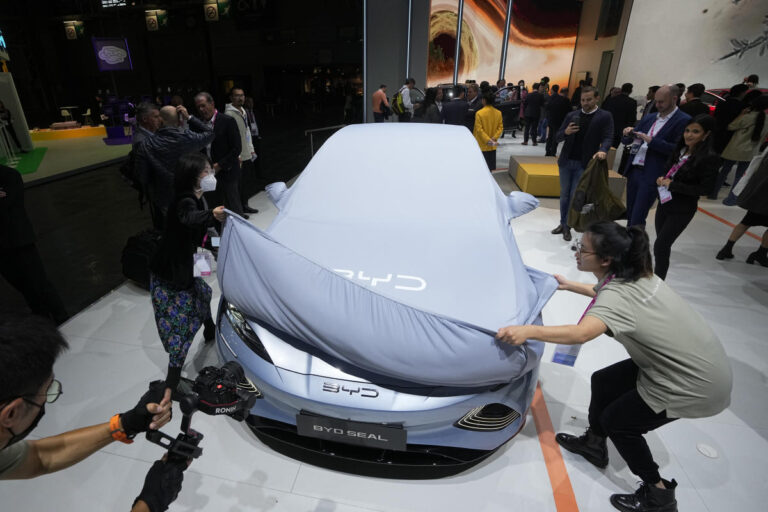Four years after the U.S.-Mexico-Canada Trade Agreement (USMCA) was adopted, Mexico and the U.S. face a common concern: the possibility that cheap Chinese-made electric vehicles could dominate a fast-growing market, undermining regional automakers such as General Motors (GM), Ford (F) and Tesla (TSLA) in the process.
Imports from China have already begun south of the U.S. border: Imports of electric vehicles and plug-in hybrids rose 443.9% in value terms in the first quarter compared with the same period last year, according to data from S&P Global Market Intelligence.
According to Reuters, one in 10 cars currently sold in Mexico is made by a Chinese automaker, and seven new brands entered the market last year alone.
“Almost overnight, you started seeing Chinese cars on the roads in Mexico,” said Juan Carlos Baker, Mexico’s former vice minister of foreign affairs and trade. “It’s very evident in how often you see Chinese cars and how aggressive the marketing and sales campaign for Chinese cars has been.”
But rising imports and investment have recently led to growing calls in the U.S. and Mexico to rein in Chinese electric vehicle makers. Baker, who played a key role in crafting the USMCA, said the threat of cheap Chinese-made electric vehicles flooding the market never came up as a concern during the two years the trade deal was negotiated.
“I was at every meeting, and Ambassador Lighthizer or anyone else who was there [the US Trade Representative office] “The Chinese are coming, so the rules of origin and other factors need to be very strict,” he said.
Baker noted that Chinese automakers have not yet started producing cars in Mexico, but its proximity to the United States has raised particular alarm in Washington. Lawmakers are concerned that auto companies could use Mexico as a back door to avoid U.S. tariffs on Chinese car imports that President Joe Biden raised to 100% last month.
BYD has publicly stated its intention to build a factory in Mexico, but the company’s CEO has stressed that the company has no plans to enter the U.S. market.
Mexico is the “perfect combination”
As the domestic market matures and sales within China slow, overseas markets are becoming more important for Chinese companies.
The early success of Chinese auto brands in Latin America offers a glimpse into the company’s expansion strategy of establishing a presence in countries with numerous free trade agreements, easy access to resources and a workforce that offers low-cost, high-quality production.
“It’s a perfect combination,” says Felipe Muñoz, an analyst at auto information firm Jato. “We’re talking about [a market with sales projected at] 1.2 million units per year. …And there is still potential for growth. And [Mexico] This is attractive to any automaker.”
Mexico is following the path of Brazil, Latin America’s largest auto market, where Chinese companies such as BYD (BYDDY) and Great Wall Motors (GWLLF) have already set up manufacturing bases.
In Brazil, already the fourth-largest importer of Chinese cars, new electric vehicle sales rose 91%, according to data from the Brazilian Electric Vehicle Association. Chinese automakers BYD, Chery and Great Wall accounted for three of the top five auto brands.
Across Latin America, Chinese EV makers have already captured 86% of the market share thanks to fierce price competition, according to JATO.
“The same formula is more or less the same in developing countries, where other cars are so expensive that electric cars are the only option,” Muñoz said. “In these economies, the regulations and safety standards are not as difficult or complex.”
Review of trade rules
Still, Chinese automakers are facing resistance as they push back on exports and overseas expansion, especially in developed markets where lawmakers are reassessing existing trade rules to prevent a surge in cheap car imports.
Chinese-made EVs currently have a market share of around 7% in Europe, according to JATO, but concerns led to an anti-subsidy investigation being launched earlier this year, and on Wednesday the EU imposed tariffs of up to 38% on imports of Chinese-made EVs.
This comes just weeks after President Biden raised import tariffs on Chinese-made electric vehicles from 25% to 100%. Tariffs on lithium-ion batteries and battery components were also increased from 7.5% to 25%.
Duo Hu, vice president of battery markets at Rystad Energy, said the tariff announcement is already starting to shift automakers’ investment decisions away from the most developed markets.
“At this point, we don’t see the U.S. as an important market for China,” Hu said.
The changing circumstances have also prompted a review of the USMCA two years earlier than scheduled, which is also necessitating a reconsideration, but new leadership in Mexico and the possible return of the Trump administration could complicate efforts on Chinese-made EVs.
Baker said Chinese companies are unlikely to find a workaround to comply with the current trade agreement’s strict auto rules of origin. The USMCA stipulates that automakers must meet three rules of origin to receive preferential treatment under the act: regional origin requirements for the whole vehicle, labor rules of origin, and standards for auto parts.
“The auto rules of origin in the USMCA are one of the hardest things for the industry,” Baker said. “You can’t import a car from China, even if it’s just disassembled, put it together, add a few parts here and there, send it to us and try to pass it off as a Mexican car. You can’t do that.”
Click here for the latest economic news and indicators to help inform your investment decisions..
Read the latest financial and business news from Yahoo Finance

